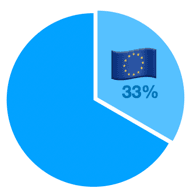
Why the multi cloud matters for your startup
Over the past decade, many startups have been lured into believing a myth: that one cloud provider can cover all of their needs.

The world is an interesting and uncertain place right now. A pandemic just hit the Homo Sapiens species massively. Technology has helped us cope with the sudden need to remain connected remotely, relying more than ever on the internet and, naturally, a distributed cloud computing infrastructure. What makes us human is our ability to bond socially and create value. The COVID-19 virus tried to strip it all away from us. But we are stronger than that, very resilient in fact, and more socially connected than ever before. It’s a fundamental need that defines our species.
The internet’s mesh structure has enabled this connection to grow stronger and more resilient during this crisis. It’s by design, of course, as the internet was built for military purposes to circumvent the loss of a strategic control & command base, so that information could somehow flow to other backup locations, unhindered. Thanks to DARPA we had an internet suddenly capable of allowing information to flow freely and be backed up in another location completely unhindered. Thanks to Tim Berners Lee, we now have the world wide web.
In a way, political and trade multilateralism creates a sort of similar mesh when it comes to the global distribution of commodities and goods, allowing free markets and transferring benefits to the end consumers.
Unfortunately, multilateralism and the internet alike are under tremendous pressure and stress, with geopolitical forces each pulling on their side of the blanket. Call it nationalism, protectionism, lobbying, disguised monopolies, dumping… all these forces are at play, and are attacking the internet and its neutrality. More recently these forces have been attacking the underlying cloud value proposition, aiming to capture an asset of exponential value: data.
One particular aspect of data is that, unlike currencies, oil or gold, it isn’t fungible; quite the opposite, this asset is usually uniquely descriptive and nominative even when anonymized.
Why is this data, our data, at stake? Because the cloud value proposition answers one basic requirement: economics at scale. The promise of the cloud is elasticity, the ability to move a virtual cursor so that the infrastructure can scale with the business. Unfortunately, given the amount of capital required to setup a proper public cloud infrastructure and associated software, the cloud service providers who happen to be large cap companies to begin with, quickly understood the network effect benefits of creating a community around it. Before you know it, developers around the world developed a sort of “religion” towards one stack or the other, thereby locking the talent inside a select few preferred development platforms.
Standards and open source solutions mitigate this situation, in waves, but over long period of times. We’ve seen this before with the OS wars, the browser wars, or with search engines to some extent. The same scenario unfolds with cloud service providers.
What happens is that we end up with a steep power law curve where 90% of the value is captured by less than 10% of the players, and where Europeans are supplying around just 10% of the demand, largely missing out on a $300b a year opportunity with a 2 digit growth too!
We often talk about sovereignty, but instead, we should talk about lack of European sovereignty, and our relative inability to participate in shaping tomorrow’s cloud infrastructure.
Europe is a great place to live, it's culturally diverse and has a bedrock of multi-millennial history. It’s a great place to balance your work and your personal life, and to raise children. It’s also a place where our common history is made out of devastating wars and human tragedy. Our thinking hasn’t been molded by right and wrong, but rather by constructing with our diversity. We have been enjoying over 70 years of peace and relative prosperity, which is unprecedented.
Europe gave the world democracy and enlightenment, centuries ago. And yet today, despite encouraging trends, Europe is behind in tech and innovation. Two other continents are racing ahead with massive scale and velocity, while both practice protectionist tactics designed to secure their advantage, and our own “buy European” instincts remain largely nonexistent. This configuration pegs Europe as the perfect battlefield for them to not only capture extra market share, but most importantly when it comes to the cloud, to control data processing, storage and exponential derivative value.
The Renaissance rebalanced how science, the arts and institutions worked together. There is a new challenge ahead, one that the EU has started addressing from the regulation angle (unfortunately) with GDPR for example. Platforms all over the world took note, and consumers are now reaping the benefits of this, to some extent improving their own individual sovereignty. But did this help our local digital economy? Quite the contrary; there is a non-proportional cost for the challengers.
We can choose to stay idle, or we can redefine the way we approach this problem, to protect our core European values, and present a third option that is different and complementary to the “me first” model the other continents offer.
In order to productize Europe’s core values, we need to wrap it all up in a Renaissance 2.0 envelope, one where we redefine how we want technology to shape our future, one where we collectively decide to shape how technology serves us.
Complex thinking is needed to change the _status quo. It has a lot to do with how buyers approach the problem, as it’s no longer a technical issue.
Choices of the past can be justified. Choices that are made now need to be educated and therefore updated since things have changed. Politicians have a hard time admitting that choices of the past are out of date with new realities, exhibiting the perfect sunk cost syndrome. It requires courage and a lot of pedagogy to explain that things aren’t where they should be. It’s a daunting task. It takes leadership, authority… and consensus too.
Concurrently, these same politicians must fend off demagogy, simplistic thinking, click-bait headlines and frustrated stakeholders.
The only thing that we should be obsessed with going forward is data sovereignty. Acknowledging the elephant in the room, nothing wrong with a little paradox, and focusing on the prize.
Today, cloud computing and storage elements are a commodity. Subtle variations exist, but overall, it’s all interchangeable — theoretically.
It is therefore not unimaginable to think that the European cloud solution providers should be able to supply at least one third of all European cloud demand. It doesn’t have to be binary, and at that point we can then start to think about sovereignty. Should we be ambitious, there is also no reason why we should not strive to address one third of the demand in the Americas, in Africa and in Asia.

To achieve this rebalancing act, we at Scaleway believe that the answer lies in a demand-side multi-cloud approach, giving cloud integrators and clients the ability to easily deploy on any cloud across any array of cloud providers. The mono-cloud approach gave us virtual machines and elasticity with a fence around it. The multi-cloud approach gives us virtual and fully distributable architectures, at a higher level of abstraction.

We had one cursor to adjust scale. We now have another cursor to balance between providers.

This multi-cloud approach empowers SaaS providers or any cloud client with cost control (pricing dynamics and spot buying), resilience against geopolitical swings or planetary crises (load balancing or radical switch), or dynamic provisioning in tune with client requirements (using the right mix of clouds hosted in data centers that are carbon neutral…). The possibilities are infinite and control is paramount.

Load Balancers, Kubernetes, Object Storage, Terraform
To achieve this, we are leading the way with an array of cutting edge multi-cloud enabling products such as our multicloud load balance, or all around Amazon S3 compatibility. We make it easy for cloud architects to design and deploy using Terraform. Higher level of abstraction, also known as Infrastructure as Code. Multi cloud is here, today.
A lot is happening right now. The Germano-French initiative GAIA-X is being launched at the time of writing (June 4, 2020), to pave the way for a common European Data Infrastructure. We join forces with our peers OVHcloud, 3DS Outscale and many others to be heard loud and clear.
National initiatives are also well underway to help institutions understand how to orchestrate a digital revolution on their own terms, and how to pick and choose the right providers for them.
A lot of it is about awareness and collective goodwill.
At Scaleway, we are proud to participate in the construction of tomorrow’s cloud infrastructure, to supply this commodity of vital importance to our clients and partners, our friends and families, fellow European citizens and fellow humans around the world.
We do so collectively, responsibly, using decarbonized and low energy as much as we can, in short: the Scaleway.

Over the past decade, many startups have been lured into believing a myth: that one cloud provider can cover all of their needs.

Scaleway will not renew its GAIA-X membership, and will focus its time, money and attention on its multi-cloud product offering - a key factor of true reversibility and openness.

The very word “cloud” itself evokes the image of fluffy, floating cotton, an immaterial substance drifting unrestricted across the sky. However, this couldn’t be further from the reality.